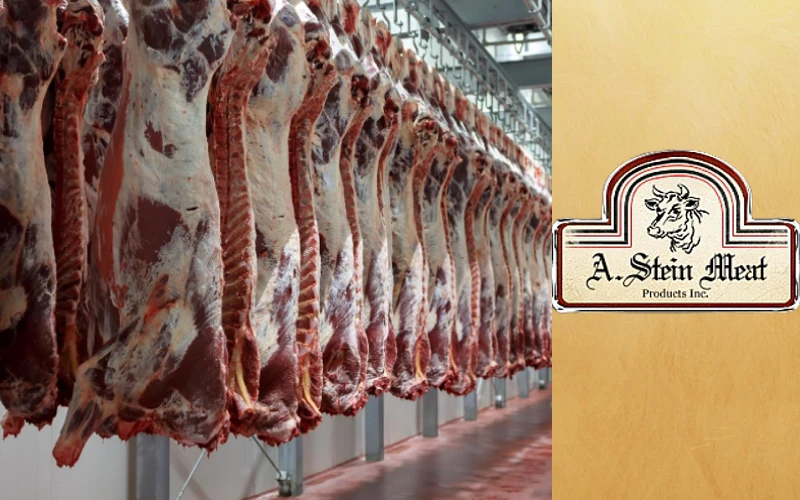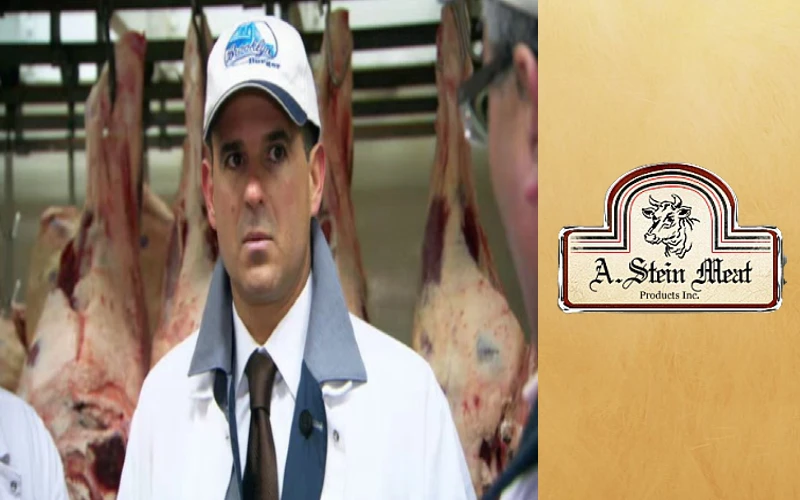Howard Mora and Alan Buxbaum, co-owners of A. Stein Meat Products, had expanded their inherited business from $4 million to $50 million in eighteen years, but they were $3.5 million in debt to the bank and were losing money every year. The Brooklyn-based pair attributed their problems to the competitive nature of the industry, claiming that they had to significantly reduce their margins in order to compete for a piece of the national high-end restaurant and supermarket market. However, the company’s problems were most likely caused by a haphazard management style and blatant incompetence. Could Marcus Lemonis assist this struggling business in turning a profit?
Table of Contents
Marcus Pays A. Stein Meat Products a Visit
Episode 2 of Season 2 of The Profit
Marcus arrived early in the morning at A. Stein Meat Products and was given a tour of the plant. He discovered that, although the company generated a good profit, the overhead expenses were exorbitant. Rent and energy cost over $60,000 a month on average, with union workers and delivery trucks thrown in for good measure. A. Stein projected to lose $400,000 that year, in addition to its fixed expenses.
Marcus was introduced to the General Manager, Frank, shortly after meeting the owners. Marcus could see right away that Frank was not operating the company efficiently. Frank, for example, had never given much attention to his workers’ productivity; he just attempted to get as much done as he could throughout the day. Frank had no clue what to say when Marcus pushed him for details on his daily production.
Marcus asked Howard and Alan if there was anything more they could do to make money. Alan informed Marcus about a new product called the Brooklyn Burger that they had just launched. They’d convert the top meat that couldn’t be sold to their high-end clients into hamburgers, which were then sold to three of the area’s main sports stadiums. Marcus felt $400,000 was a lot of money to spend on marketing the Brooklyn Burger. He decided to go through the contracts in order to figure out what A. Stein was receiving out of these business sponsorships. Marcus felt that if he could get the burgers into major supermarket chains, he could increase sales significantly.
Marcus could see the proprietors knew how to make excellent meat products, but he wasn’t certain they knew how to manage the finances. As a result, Marcus went to the Accounting Department and met Donna, the office manager. She was in charge of invoicing, accounts payable, and accounts receivable, but she had no accounting responsibilities. Howard and Alan were the ones who did it, she said.
Donna was the one who approached the producers and requested assistance. She was particularly worried about Accounts Receivable, which had not been paid to the tune of almost $4 million. Marcus questioned the proprietors about it, but they dismissed him. They stated that one of the customers was dealing with family issues, while the other was just sluggish to pay. Marcus was taken aback. Howard and Alan’s firm would go out of business if they didn’t find out a method to collect what was due to them. He mentions that A. Stein owed suppliers approximately a half-million dollars, which was more than the company had.
Marcus offered Howard and Alan his diagnosis later, in an upscale restaurant serving A. Stein’s meats: “The product and people are excellent, but the process is flawed.” He inquired of the two as to what they expected of him and what he would get in return.
Howard requested $5 million in exchange for a third of the firm, but Marcus says he wouldn’t make a transaction for less than 50% of the company since it would require so much operating capital to get the company out of its hole. Marcus then provided $1 million in working capital to get the payables under control. Howard and Alan retaliated with a $4 million demand. Marcus shook his head and said that he would not be willing to pay more than $1 million for the property. The owners recognized they needed Marcus’ assistance and accepted his offer.
A. Stein’s New Direction
Marcus spoke with A. Stein’s staff the following morning. He described the company’s position and advised them to recover money due to them, reduce expenses, and increase income. His revenue-generating approach was to sell the Brooklyn Burger to grocery shops. The first order of business, however, was to attempt to collect on past-due invoices. General Manager Frank was hidden in the other room while the staff was aggressively contacting clients. Frank lacked a feeling of urgency and didn’t appear to realize the business was in grave circumstances, according to Marcus.
Marcus, on the other hand, announced intentions to reduce the workspace and reorganize the process. He and Alan visited one of the stadiums where the Brooklyn Burger was displayed after presenting a supermarket packaging idea for the burger. Marcus saw that A. Stein wasn’t receiving enough money from their business sponsorships, so he ended the agreements. Marcus’ decision to fire Frank as General Manager came when Donna discovered Frank putting out purchase orders without her permission for the second time. He had been demoted to Floor Manager and would have to accept a salary reduction as a result.
Marcus hired an accountant to go over the accounts, and she found that Howard and Alan had given false information. Marcus had been informed by the owners that they had $2 million in payables when the true number was almost double that. Furthermore, the bank loan was larger than they had started, and the bank demanded urgent payment. The auditor said that A. Stein was on the verge of bankruptcy and that he couldn’t see how they could be in business for more than two weeks. Marcus knew it was a bad idea to go through with the transaction, but he didn’t want the business to fail. He was concerned about the workers who might lose their jobs since there was too much history.
Marcus approached Howard and Alan to inform them that he would not invest $1 million but would want to assist them. He inquired as to what they urgently need, and Howard responded with a sum of $200,000.00. Marcus said that he was ready to give them the money, but that it was not a gift; instead, he requested that A. Stein transfer the rights to Brooklyn Burger to him. He’d repackage it and prepare it for sale in supermarkets, in the hopes of injecting some profit into A. Stein and turning the business around.
Following the Profit
The fallout from A. Stein’s appearance on The Profit has been particularly nasty. Marcus did get the roughly $200,000 he promised Mora and Buxbaum, but he never received the Brooklyn Burger rights. Marcus rejected the owners’ offer to return the money, claiming that their verbal agreement was for Brooklyn Burger. He subsequently filed a lawsuit against A. Stein, but according to New York law, a verbal agreement made on television is not a legal contract. Marcus was found guilty in court, but the parties reached an undisclosed settlement.
Marcus wasn’t the only one who filed a lawsuit against A. Stein. Donna Johnson, the office manager, filed a $3 million discrimination and defamation claim against her former employers (she left), alleging that she was branded a “traitor” and “backstabber” after informing Lemonis that the company’s financial records were incorrect. However, A. Stein went out of business in late 2014 after defaulting on its obligations, so she’s unlikely to see any money regardless of the outcome of the lawsuit.
- Stein Meats’ tale is far from finished. Mora and Buxbaum were arrested in September 2019 for stamping “Prime” on “Choice” meats from 2011 to 2014. They were charged with wire fraud conspiracy, a federal crime punishable by up to 20 years in jail.
It’s unfortunate that a family company that has been in operation for almost 75 years was lost due to carelessness. Bill collection is a disagreeable job, but A. Stein might have maintained its history and perhaps flourished if Mora and Buxbaum had kept track of their receivables on a regular basis.
Royal Pitch is not connected with A. Stein Meats, The Profit, or any of its subsidiaries, and the information given in this article is only for educational purposes.
Visit the rest of the site for more articles.




0